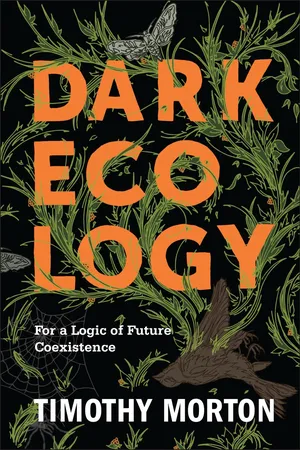![]()
NOTES
THE FIRST THREAD
1. Thomas Hardy, Tess of the D’Urbverilles, ed. David Skilton, intro. A. Alvarez (Harmondsworth: Penguin, 1984), 136–39.
2. Timothy Morton, Hyperobjects: Philosophy and Ecology After the End of the World (Minneapolis: University of Minnesota Press, 2013).
3. Tom Engelhardt, “The 95% Doctrine: Climate Change as a Weapon of Mass Destruction,” openDemocracy, May 27, 2014, http://www.opendemocracy.net/print/83094 (accessed June 11, 2014).
4. In 2013 Paul Kingsnorth published an essay called “Dark Ecology: Searching for Truth in a Post-Green World” in Orion magazine (January-February 2013). Dark ecology is a term I had coined in 2004 and explored in Ecology Without Nature: Rethinking Environmental Aesthetics (Cambridge: Harvard University Press, 2007).
5. Oxford English Dictionary, weird, adj. http://www.oed.com (accessed April 9, 2014).
6. S. N. Hagen, “On Nornir ‘Fates,’” Modern Language Notes 39, no. 8 (December 1924): 466–69.
7. Oxford English Dictionary, “weird,” n. 1.a., 1.b., 2.a, http://www.oed.com (accessed October 4, 2012).
8. Oxford English Dictionary, “worth,” v.1, http://www.oed.com (accessed October 4, 2012).
9. Oxford English Dictionary, “weird,” adj. 1, 2.a., 3, http://www.oed.com (accessed December 11, 2013).
10. Oxford English Dictionary, faerie, fay n.2, http://www.oed.com (accessed September 25, 2014).
11. C. S. Holling and Gary K. Meffe, “Command and Control and the Pathology of Natural Resource Management,” Conservation Biology 10, no. 2 (April 1996): 328–37.
12. Michael Wines, “Mystery Malady Kills More Bees, Heightening Worry on Farms,” New York Times, March 28, 2013, http://www.nytimes.com/2013/03/29/science/earth/soaring-bee-deaths-in-2012-sound-alarm-on-malady.xhtml?pagewanted=all&_r=0 (accessed March 31, 2013). Brad Plumer, “We’ve Covered the World in Pesticides: Is That a Problem?” Washington Post, August 18, 2013, http://www.washingtonpost.com/blogs/wonkblog/wp/2013/08/18/the-world-uses-billions-of-pounds-of-pesticides-each-year-is-that-a-problem/ (accessed August 25, 2013).
13. Suzanne Goldenberg, “Americans Care Deeply About ‘Global Warming’—But Not ‘Climate Change,’” Guardian, May 27, 2014, http://www.theguardian.com/environment/2014/may/27/americans-climate-change-global-warming-yale-report/print (accessed June 2, 2014).
14. Lewis Carroll, Alice Through the Looking Glass in The Annotated Alice: The Definitive Edition, ed. Martin Gardner (New York: Norton, 2000), 157.
15. Paul Crutzen and Eugene Stoermer, “The Anthropocene,” Global Change Newsletter 41, no. 1 (2000): 17–18.
16. Elizabeth Kolbert, The Sixth Extinction: An Unnatural History (New York: Holt, 2014).
17. Shu-zhong Shen et al., “Calibrating the End-Permian Mass Extinction,” Science Express, November 17, 2011, www.sciencexpress.org/17November2011/Page1/10.1126/science.1213454 (accessed November 20, 2011).
18. Dipesh Chakrabarty, “The Climate of History: Four Theses,” Critical Inquiry 35 (Winter 2009): 197–222 (206–7).
19. The view I am calling out of date is expounded in Peter Sloterdijk, In the World Interior of Capital (Cambridge: Polity, 2014).
20. An exemplary passage is found in Sloterdijk himself, ibid., 251–54.
21. I put a hyphen between post and modern in the manner of Iain Thomson. See Heidegger, Art, and Postmodernity (Cambridge: Cambridge University Press, 2011); “Heidegger’s Aesthetics,” in Edward N. Zalta, ed., The Stanford Encyclopedia of Philosophy (Summer 2011 edition), http://plato.stanford.edu/entries/heidegger-aesthetics/, November 30, 2014.
22. The highly necessary fantasy component of this imaginary is found in premodern Europe, complicating the view expounded most recently by Sloterdijk (and by a host of others, for instance Deleuze) that the drive to homogeneity and speed is a symptom of the modern. See Timothy Morton, The Poetics of Spice: Romantic Consumerism and the Exotic (Cambridge: Cambridge University Press, 2000).
23. See Morton, Hyperobjects.
24. Michel Foucault, The Order of Things: An Archaeology of the Human Sciences (New York: Random House, 1994), 387.
25. I refer to the action performed by the government of the Maldives in 2009.
26. Quentin Meillassoux, After Finitude: An Essay on the Necessity of Contingency, trans. Ray Brassier (New York: Continuum, 2009), 5.
27. IPCC (Intergovernmental Panel on Climate Change), Climate Change 2014: Summary for Policymakers, http://www.ipcc.ch/pdf/assessment-report/ar5/syr/SYR_AR5_SPM.pdf (accessed November 23, 2014).
28. Chakrabarty, “The Climate of History.”
29. Genetic affinities between humans and Neanderthals are becoming more obvious every day. Carl Zimmer, “Neanderthals Leave Their Mark on Us,” New York Times, January 29, 2014, http://www.nytimes.com/2014/01/30/science/neanderthals-leave-their-mark-on-us.xhtml?hpw&rref=science&_r=0 (accessed January 31, 2014).
30. Timothy Morton, Realist Magic: Objects, Ontology, Causality (Ann Arbor: Open Humanities, 2013).
31. Meillassoux and Ray Brassier hold this position.
32. Hence the charm of Neil Shubin’s documentary Your Inner Fish (PBS, 2014).
33. Charles Darwin, The Origin of Species, ed. Gillian Beer (Oxford: Oxford University Press, 1996), 160.
34. Jacques Derrida, “Hostipitality,” trans. Barry Stocker with Forbes Matlock, Angelaki 5, no. 3 (December 2000): 3–18; Timothy Morton, The Ecological Thought (Cambridge: Harvard University Press, 2010), 14–15, 17–19, 38–50.
35. Sesame Street, “We Are All Earthlings,” Sesame Street Platinum All-Time Favorites (Sony, 1995); USA for Africa, “We Are the World” (Columbia, 1985).
36. See for instance Kim Stanley Robinson, Red Mars (New York: Random House, 1993), Green Mars (New York: Random House, 1995), Blue Mars (New York: Random House, 1997).
37. Carroll, Alice Through the Looking Glass, 187.
38. James Lovelock, The Revenge of Gaia: Earth’s Climate Crisis and the Fate of Humanity (New York: Basic Books, 2006), 6–7.
39. Douglas Kahn, Earth Sound Earth...
